One year on from Biden’s Inflation Reduction Act: Britain risks ‘divine right’ as frontrunner in green race

Joe Biden’s Inflation Reduction Act is a year old today, and energy experts have warned Britain risks falling behind the pack if it doesn’t catch up.
The UK has been urged to stump up more cash in vast subsidy packages for low carbon projects, and implement regulatory reform, in a bid to rival markets on the first anniversary of the US act, dubbed IRA.
A leading industry voice, Emma Pinchbeck, chief executive of Energy UK, warned Britain has no “divine right” to its frontrunner position as a developer of clean energy.
She regarded President Joe Biden’s vast £290bn ($369bn) subsidy package for green energy to be a “game changer” for the investment landscape.
“With growing global competition for private investment that can choose its location, a failure to respond will see us quickly fall behind and jeopardise ambitious targets for increasing our own sources of clean energy and decarbonising our whole economy.”
“While we can’t necessarily replicate what the US has done, resting on our laurels and successes so far would be a very serious mistake,” she said.
Downing Street is committed to net zero over the next three decades and decarbonising the electricity grid by 2035, and has outlined highly ambitious generation targets for offshore wind, solar, nuclear and hydrogen in its energy strategy – published following Russia’s invasion of Ukraine.
With soaring gas prices driving the energy crisis, pushing for green energy has also become a matter of supply security as well as climate change.
This motivated the launching of the US Inflation Reduction Act on 16 August 2022, in a bid to speed up White House plans to reach its climate goals and boost productivity through clean energy projects.
However, Prime Minister Rishi Sunak has opted against entering a full-on subsidies race with the US, which has a considerably larger economy and more spending power than the UK.
Instead, it has focused new funding announcements on specific technologies such as carbon capture and small modular reactors, amid two rafts of energy pledges this year.
This includes £20bn for shortlisted carbon capture projects, and up to £20bn for the winning bidders in its competition for the scaled down nuclear power plants.
Johanna Lehne, programme lead at climate think tank E3G, called on the government to consider regulatory reforms such as cutting planning red tape to send strong market signals, in line with the European Union’s response to the subsidy pledges.
“The UK has a broad range of tools and valuable assets in the form of its regulatory framework and its expertise on net-zero technologies, through which it could still lead and drive the green transition in key supply chains,” she said.
Gideon Salutin, researcher at progressive think tank, the Social Market Foundation, urged the government not to backtrack of net zero commitments, and instead provide certainty to “give British businesses the reassurance and funding they need to invest in our economy.”
“A year on, we know that British policymakers’ worst fears about the Inflation Reduction Act have not materialised. Instead of continuing to treat it like a threat, they should recognise it as an opportunity for UK manufacturers – if the right actions are in place,” he said.
Advocacy group Climate Power estimate there has been £218bn ($278bn) in clean energy investments Stateside over the first year of the US Inflation Reduction Act.
Green energy players such as energy storage specialist Zenobe and hydrogen producer Sunfire have both told City A.M. this year they would consider expansions in the US over other markets following the subsidy announcements.
Troubled battery cell producer AMTE Power has also raised concerns about the country’s investment regime.
A spokesperson for the Department for Energy Security and Net Zero said: “We won’t apologise for moving faster and earlier on clean energy than many other countries, and last year renewables accounted for over 40 per cent of our electricity. This is in part thanks to us having the four largest operational winds farms in the world off our shores and significant investment in nuclear power.
“We have already attracted around £120bn investment in renewables since 2010, kickstarting new industries like floating offshore wind, with a further £100bn private sector investment across low carbon sectors expected by 2030 – boosting our energy security and supporting up to 480,000 jobs.”